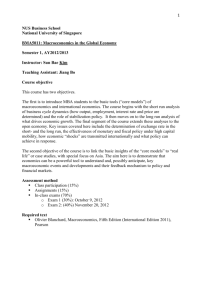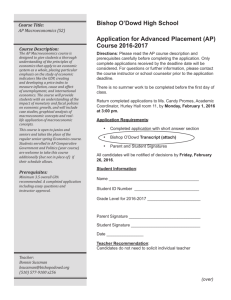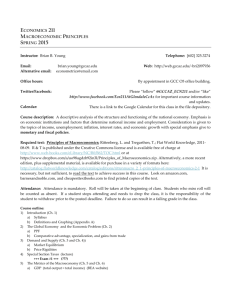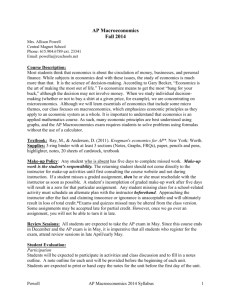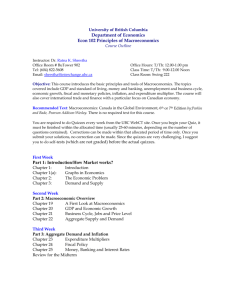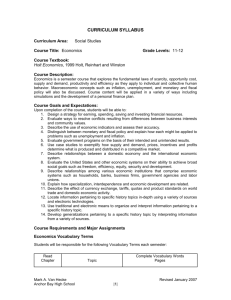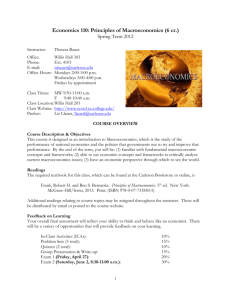ECON 2301 - SaigonTech
advertisement
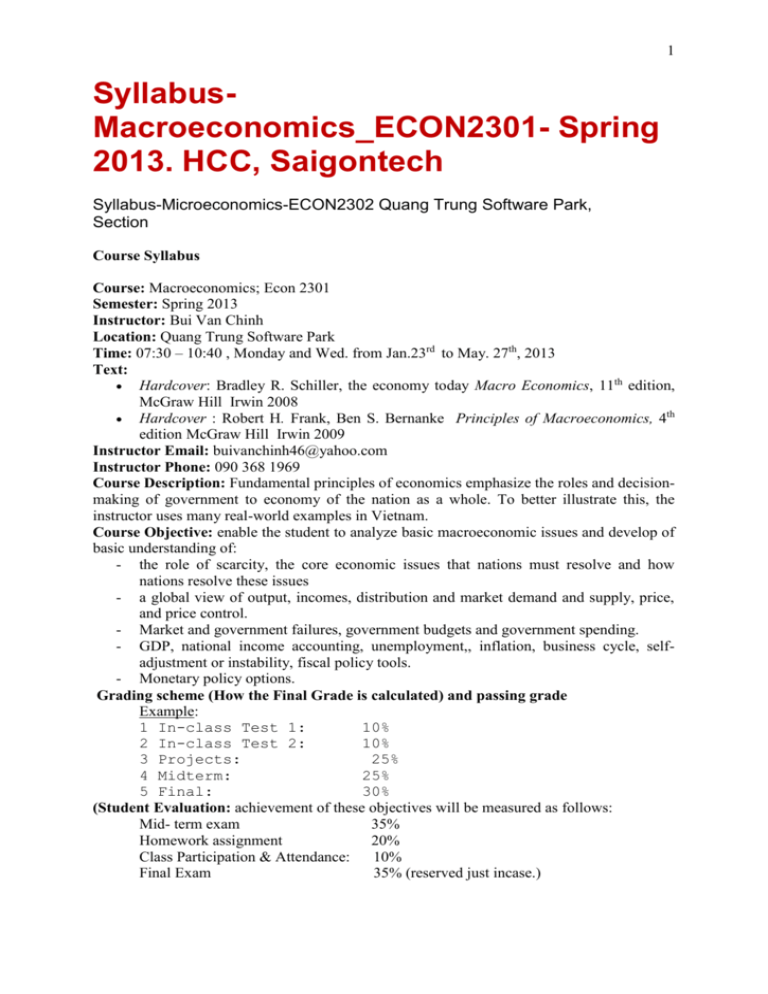
1 SyllabusMacroeconomics_ECON2301- Spring 2013. HCC, Saigontech Syllabus-Microeconomics-ECON2302 Quang Trung Software Park, Section Course Syllabus Course: Macroeconomics; Econ 2301 Semester: Spring 2013 Instructor: Bui Van Chinh Location: Quang Trung Software Park Time: 07:30 – 10:40 , Monday and Wed. from Jan.23rd to May. 27th, 2013 Text: Hardcover: Bradley R. Schiller, the economy today Macro Economics, 11th edition, McGraw Hill Irwin 2008 Hardcover : Robert H. Frank, Ben S. Bernanke Principles of Macroeconomics, 4th edition McGraw Hill Irwin 2009 Instructor Email: buivanchinh46@yahoo.com Instructor Phone: 090 368 1969 Course Description: Fundamental principles of economics emphasize the roles and decisionmaking of government to economy of the nation as a whole. To better illustrate this, the instructor uses many real-world examples in Vietnam. Course Objective: enable the student to analyze basic macroeconomic issues and develop of basic understanding of: - the role of scarcity, the core economic issues that nations must resolve and how nations resolve these issues - a global view of output, incomes, distribution and market demand and supply, price, and price control. - Market and government failures, government budgets and government spending. - GDP, national income accounting, unemployment,, inflation, business cycle, selfadjustment or instability, fiscal policy tools. - Monetary policy options. Grading scheme (How the Final Grade is calculated) and passing grade Example: 1 In-class Test 1: 10% 2 In-class Test 2: 10% 3 Projects: 25% 4 Midterm: 25% 5 Final: 30% (Student Evaluation: achievement of these objectives will be measured as follows: Mid- term exam 35% Homework assignment 20% Class Participation & Attendance: 10% Final Exam 35% (reserved just incase.) 2 Mid- term and final examinations will consist totally of multiple-choice questions. Midterm test will take totally 40 and 75 minutes respectively with 30 multiple- choice questions, and 2 topics for essay. During this course, each student is asked to write an assignment independently about a real- word economic issue for a specific market in Vietnam. The class participation grade will be based on a student’s preparedness, assigned readings, and his/her overall contribution to class discussions. The instructor may assign some homework problems out of the book; these will be discussed in class, and will be part of your class participation grade. Grades will typically be scored on a scale of: Grade A B C D F Final Score 90-100 80-89 70-79 60-69 0-59 Provisions for missed exams may be made for extraordinary situations, on a case by case basis, at the instructor’s sole discretion. Students who may miss an exam should make every effort to inform the instructor prior to the exam. Exam Mid-term Final Exam Type Open/Close book Number of Questions Duration (minutes) Points Chapters Online-Multiple Choice (on Computer) close 30 40 60 1,2,3,4,5,6, 7 Essay (on Paper) Open 2 75 40 1,2,3,4,5,6, 7 close 30 40 60 Open 2 75 40 Online-Multiple Choice (on Computer) Essay (on Paper) 8,9,10,14, 8, 9,10,14, Class Format: the class will consist of weekly lectures, class discussion, and review assigned homework questions and exercises. It is vital that students read class assignments and complete the homework assignments, in order to keep up with the class and participate in class discussion. In general, a typical class routine will be: 1) Lecture relating to the new assigned reading. 2) Review of homework, and clarifications of previous lectures/reading. 3) Class discussion of the new assigned reading and lecture. Attendance: Regular class attendance is expected, and poor attendance may reduce a student’s class participation grade. Students are expected to submit their written notices to the office or the instructor for their absence before class. Those who are absent more than ten (10) hours will be dropped from the course and receive an F 3 Academic Honesty: Cheating in any form and plagiarism will not be tolerated. Any student discovered cheating on an examination or plagiarizing in writing assignment will be dropped from the course and receive an F, and if deemed necessary, the matter will be forwarded through the channels prescribed in the HCCS Student Handbook. COURSE LEARNING OUTCOMES and LEARNING OBJECTIVES ECON 2301 Principles of Macroeconomics Course Student Learning Outcomes (SLO): 4 to 7 1. Demonstrate knowledge of basic economics principles common to all economic systems: supply and demand analysis; production analysis 2. Demonstrate knowledge of concepts dealing with market equilibrium, macroeconomics equilibrium: roles of government; economic measurements; economic goals 3. Demonstrate knowledge of concepts dealing with monetary and fiscal policy: fiscal policy; Keynesian policies; supply-side policies 4. Demonstrate knowledge of monetary theory and economic growth: money and banks; the Federal Reserve system Learning Objectives (Numbering system should be linked to SLO e.g., 1.1, 1.2, 1.3, etc.) 1. Demonstrate knowledge of basic economics principles common to all economic systems: supply and demand analysis; production analysis 2. Demonstrate knowledge of concepts dealing with market equilibrium, macroeconomics equilibrium: roles of government; economic measurements; economic goals 3. Demonstrate knowledge of concepts dealing with monetary and fiscal policy: fiscal policy; Keynesian policies; supply-side policies 4. Demonstrate knowledge of monetary theory and economic growth: money and banks; the Federal Reserve system 4 Class Schedule Date Topic Required reading 23 Jan 2013 Economics: the core issues Chapter 1 week 1 20 Feb. 2013 The US economy: a global view Chapter 2 week 2 27 Feb. 2013 Supply and demand Chapter 3 week 3 6 Mar. 2013 The public sector Chapter 4 week 4 13 Mar. 2013 National-income accounting Chapter 5 week 5 20 Mar. 2013 Unemployment Chapter 6 week 6 27 Mar. 2013 Midterm test 3 Apr. 2013 Inflation Chapter 7 week 8 10 Apr. 2013 Business cycle Chapter 8 week 9 17 Apr. 2013 Aggregate demand Chapter 9 week 10 24 Apr. 2013 Self-adjustment or instability Chapter 10 week 11 Fiscal policy Chapter 11 week 12 8 May, 2013 Deficits, surpluses, and debts Chapter 12 week 13 15 May, 2013 money and banks Chapter 13 week 14 Review and Final test main points of all chapters from chapter 8, 9, 10, 11, 12, 13, and 14 Week 15 1 May, 2013 (make up class on another day) 22 May, 2013 29 MAY 2013 main points of each chapter from 1 to 6 week 7 Instructions end week 16 Note: Class ECON1: from 07:30 to 10: 40 on every Wednesday
